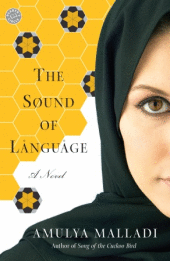 Category: Fiction
Category: FictionFormat: Trade Paperback, 256 pages
Publisher: Ballantine Books
Pub Date: December 26, 2007
Price: $16.95
It is not unheard of for Denmark to be wary of – even hostile to – refugees (mostly from Muslim countries like Turkey, Somalia, Pakistan, Afghanistan) in its midst. Some say the media perpetuate a stereotyped image of refugees as parasites, wanting to feast on Denmark's generous welfare system. Others are concerned that refugees do not want to become Danes, desiring instead that the Danes make way for their cultures, ideas etc., many of them unacceptable, like the wearing of the hijab, forced marriages, marriages between cousins etc. While all Danes don't think the same way, the ones that do are fairly vocal and as a result Denmark does come across (to me, atleast) as being a little racist.
Amulya Malladi, an Indian author, married to a Dane, addresses these issues in her latest fictional work titled "The Sound of Language". In this beautiful and honest piece of writing, Raihana, an Afghan widow comes to Denmark from a Pakistani refugee camp to start a new life. She is sponsored by fellow Afghans who with traditional Afghan hospitality invite her to stay with them for as long as she wants.
There are two things all refugees must do when they arrive in Denmark,one is to learn Danish and the other is to land a "praktik" or a job that enables them to earn money as well as practice their Danish. Raihana lands a job with an elderly beekeeper and widower, Gunnar. At first their relationship is strained because Gunnar (and especially his family who are protective of him) don't like the idea of this young Muslim girl coming to the house. THey are afraid she will take advantage of his loneliness and his kindness. On the other hand, Raihana's people also don't want her working for a "white" man whom they feel might take sexual advantage of this young, pretty widow.
But as Raihana and Gunmar continue to work together all preconceived stereotypes melt away and they grow genuinely fond of each other even introducing their families to each other and thus building a bridge of friendship between two communities that hardly ever mingle.
The novel sheds light on Denmark's attempts at building a multicultural society....its successes and its failures. For it to truly succeed, both, Danes and the new refugees have to learn to meet each other in the middle.
What made Amulya Malladi choose this subject for her current novel? In an interview she says she found immigrating to Denmark from the US very challenging. The people aren't the friendliest in the world and nor is the weather, but as she has a Danish husband and a familial support system, integration for her was a relatively painless procedure. However, whenever she sees a refugee she is drawn to how difficult it is must be for them to start life afresh in this foreign land and thus the story was born. Also, she wanted to explore how communication takes place and relationships are built when there is no common language and the relationship between Gunnar and Raihana is very much a study of that.
I have read all Amulya's books and she has yet to disappoint. Ofcourse, some of the characters in this novel were quite cliched but I forgive her for that because I don't know if you can weave a story about immigration, racism etc without resorting to a few stereotypes for your characters.
Other notable reads:
Chronicle in Stone by Ismail Khadare
Ismail Kadare’s classic novel of a boy’s coming of age in the midst of the horrors of war (Albania), in a stunning new translation.
The Tears of Sheba: Tales of Survival and Intriuge in Arabia by Khadija Al-Salami
The inspirational account of a remarkable woman, the story of her life is set against the background of civil war and family strife in Yemen. A wonderful read for anyone interested in Yemen or in the Middle East. I was completely swept away by Khadija's story and loved how she wove stories of Yemen's history and culture into her own.
